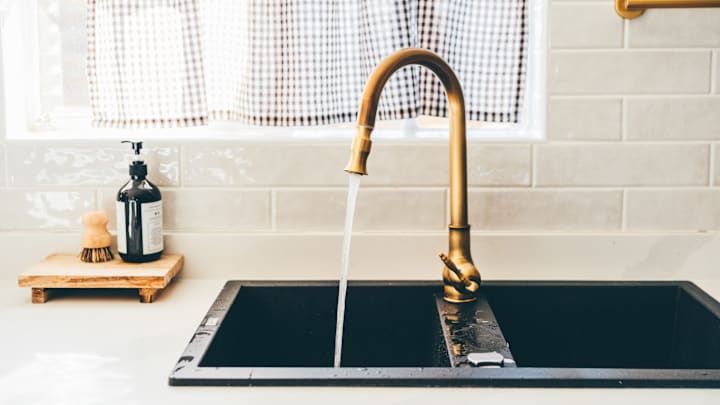Drains and garbage disposals might seem like they can handle just about anything, but they’re not built for everything you toss at them. In fact, a surprising number of everyday foods and household items can clog your pipes, wear down the disposal, or seep into waterways, causing more significant problems. From dough that turns into cement to dairy that can hurt fish, here are 10 things you should think twice about sending down the sink.
- Sourdough Starters
- Coffee Grounds
- Fats, Oils, and Grease (FOG)
- Pasta and Rice
- Milk and Dairy Products
- Certain Vegetables
- Eggshells
- Flour
- Medications
- Paint and Cleaning Chemicals
Sourdough Starters

During the pandemic baking boom, many home bakers learned the hard way that sourdough starters and sinks don’t mix: Starters—which combine water, flour, and natural yeast—either clog your pipes outright or stick to the sides and catch other food debris, which could eventually lead to a clog. An easier and safer alternative is to dispose of the mixture in the trash.
Coffee Grounds

Coffee grounds might be finely ground (as their name suggests), but that doesn’t mean they wash away easily. In fact, they tend to clump together (or mix with grease and soap residue), forming a dense sludge that, over time, can block pipes. A better option is to compost them: They make excellent fertilizer for garden soil.
You Might Also Like ...
- 10 Foods You Should Never Put in the Freezer
- You Probably Aren’t Cleaning Your Sink Enough
- 10 Things You Should Never Put in an Air Fryer
Add Mental Floss as a preferred news source!
Fats, Oils, and Grease (FOG)

Fats, oils, and grease (a.k.a. FOG) may pour into the sink as a liquid, but they quickly solidify into a substance that, layer by layer, lines your pipes until almost nothing can flow through. Municipalities across the country identify FOG as one of the primary causes of sewer backups—FOG can also lead to fatbergs—and it’s detrimental to the environment, as backups allow untreated sewage to seep into an area’s waterways and ecosystems.
Pasta and Rice

Food scraps like pasta and rice can be deceptively hazardous to your drains. That's because these starchy staples continue to absorb water even after cooking, swelling into sticky masses that clog pipes. Your best option is to toss them in the trash or compost where accepted.
Milk and Dairy Products

Milk might not block your pipes (at least not right away—the fats in it could contribute to FOG), but it does cause problems downstream: When dairy breaks down, it depletes oxygen in waterways, making it harder for fish and other aquatic life to survive. You can compost milk instead.
Certain Vegetables

While most fruits and vegetables are safe for the sink, stringy scraps like celery and asparagus can wear down disposal blades—and even if they do manage to slip through, the long fibers often snag on other debris and cause clogs farther down the line. Corn husks are too thick for garbage disposal blades to tackle, while onion skins are often too thin: They can slip past the blades and stay where they land. Potato peels that end up in your drain will turn into a mushy mess—and a future clog.
Eggshells

People often say that tossing eggshells into the disposal helps sharpen the blades, but that’s nothing more than a myth. In reality, the shell pieces can mix with grease or other food scraps and create clogs, or settle in pipes and slow down water flow. And since eggshells break down slowly, they can accumulate in septic systems and cause costly problems in the future. Instead, add them to the compost or sprinkle them in the garden—they’re an excellent natural fertilizer.
Flour

As with a sourdough starter, flour and water mixed together is a recipe for a plumbing disaster. When rinsed down the drain, the fine flour particles form a gummy paste that hardens inside pipes, often cementing themselves around other bits of food waste and eventually causing a costly clog.
Medications

Flushing unused pills might seem harmless, but wastewater treatment plants aren’t designed to filter pharmaceuticals. In fact, studies have shown traces of medications in rivers and lakes, where they can affect wildlife. Instead, use your local pharmacy’s take-back program or follow FDA disposal guidelines.
Paint and Cleaning Chemicals

Solvents and harsh cleaners may seem like liquids that will just wash away, but they can actually eat through pipes and cause damage over time. And paint—even paint water with just a bit of the material in it—can clog your pipes. Wastewater plants also can’t filter out many of the toxic ingredients in these substances, so they end up in rivers and groundwater, where they harm fish and wildlife. The safer option is to take them to a local hazardous waste facility for proper disposal.
